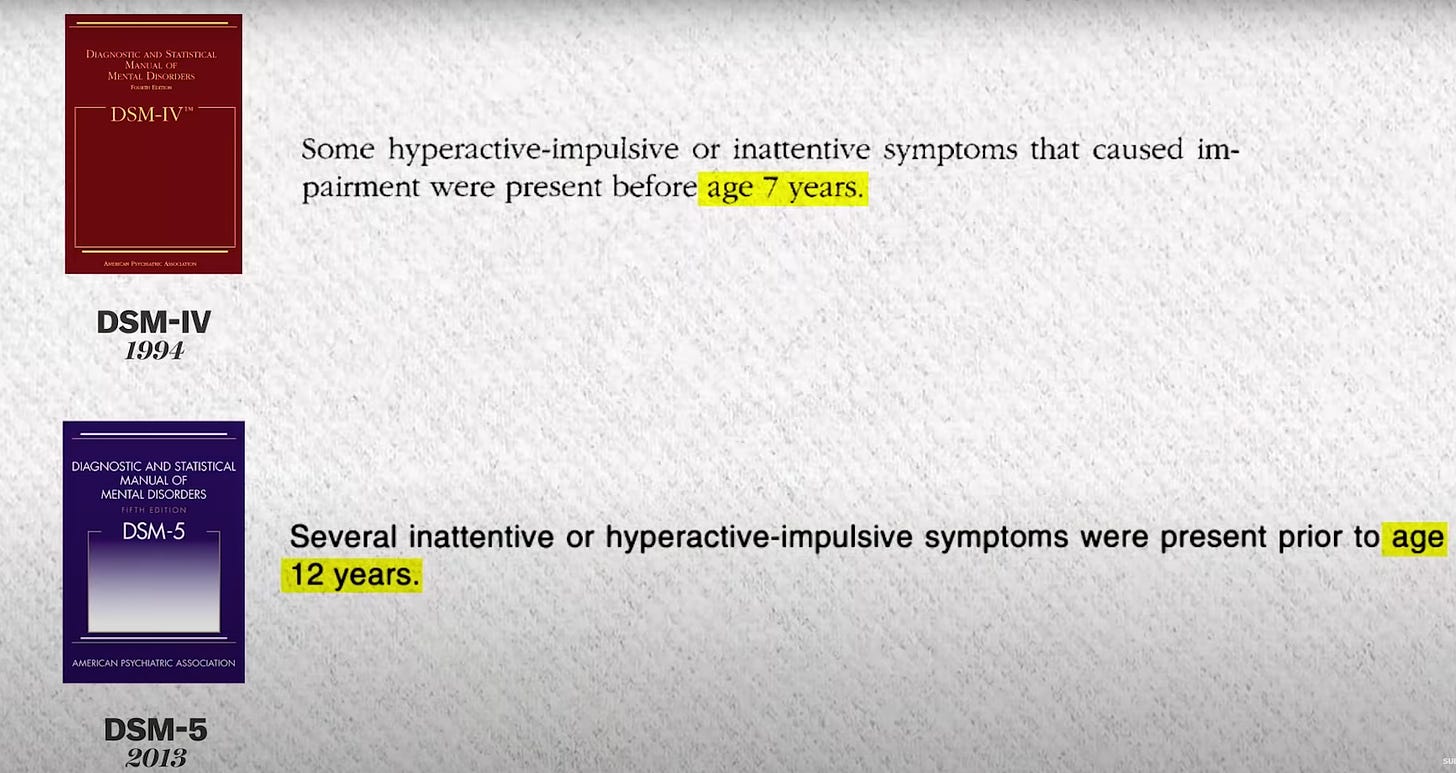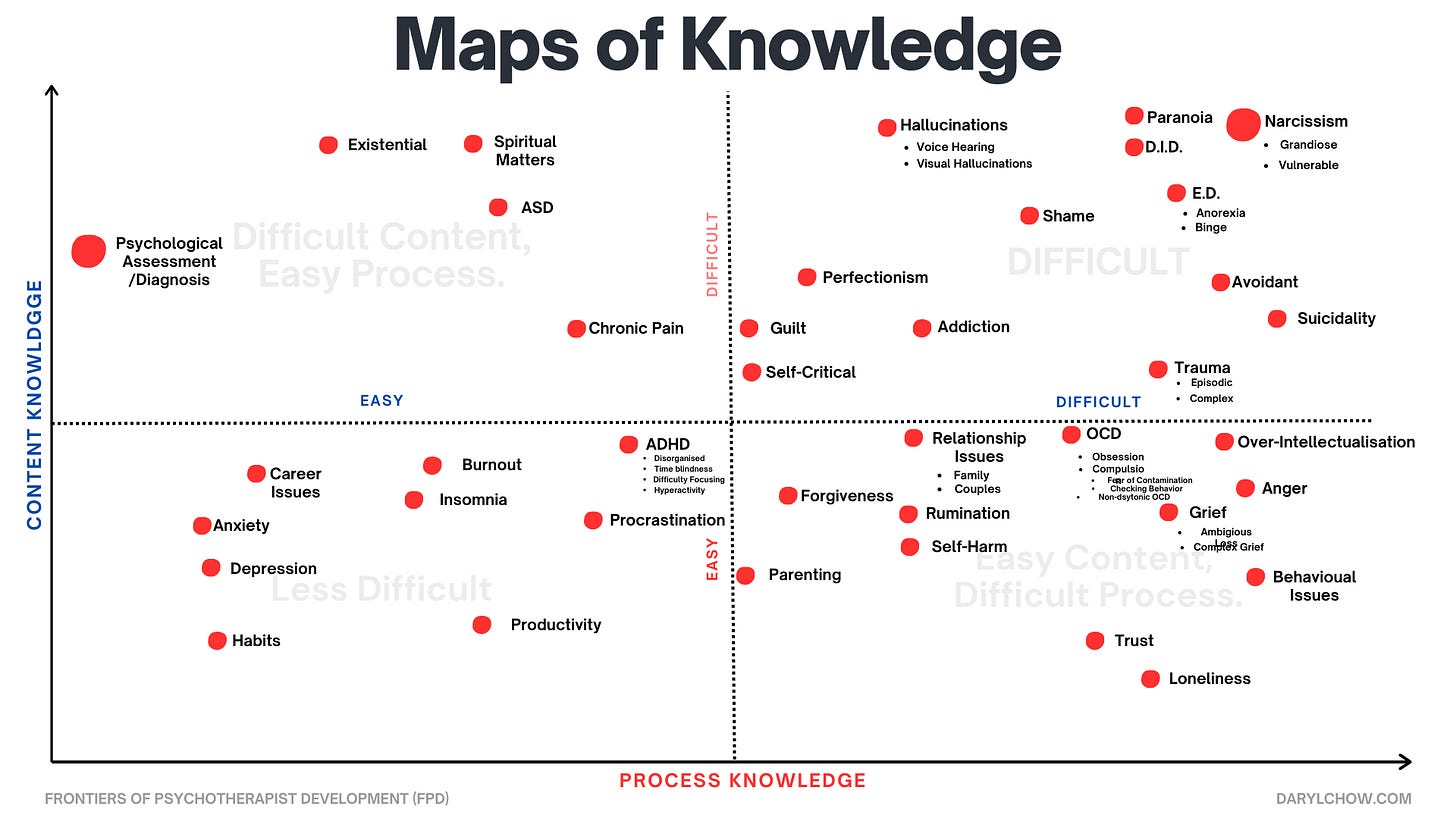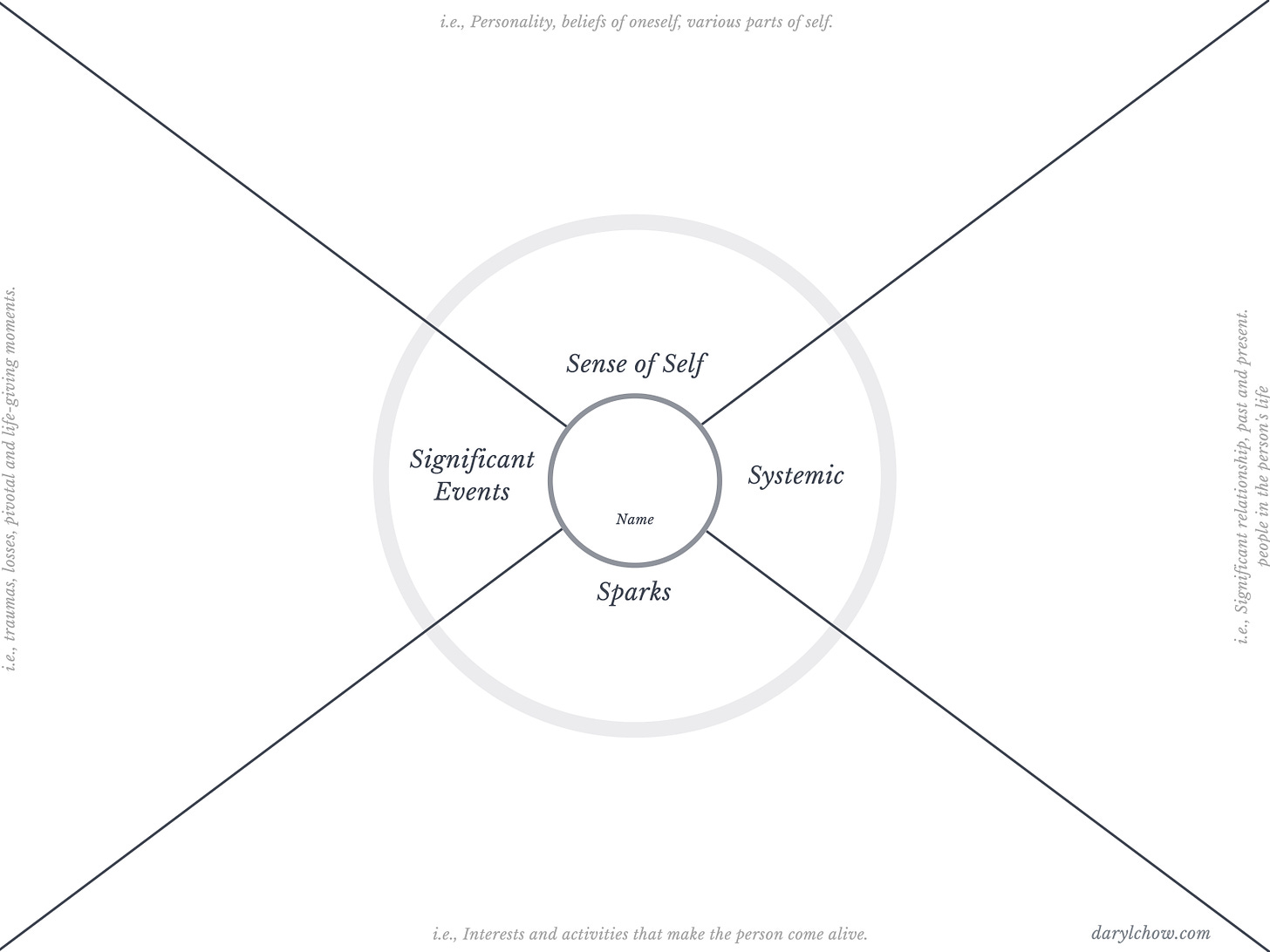Note: This is a compilation of Frontier Friday, a weekly Substack published, originally released on 16 Jun. 2023
PART I
One of my clients in his mid-20’s said to me, “How is it that nearly all of my friends are diagnosed with ADHD?”
I don’t know about you, but in the last few years, more and more adults in my clinical practice are asking me the same question: “Do I have ADHD?”
Interestingly, many of them aren’t actually interested in seeking medication.
A highly entrepreneurial client who was wondering if he has ADHD said, “Skills before pills.”
Well said.
But first, there are two things we need to tease apart before going into this week’s recommendations.
First, what the heck is going on in our culture that’s leading to this increased suspicion that one has this diagnosis?
Second, is it actually helpful to have this diagnosis?
Concept Creep
Social psychologist, Nick Haslam from University of Melbourne coined the term concept creep, describing how psychological concepts often grow to expand far beyond their original meaning, broadening over time.
There are two types of extension in concept creep:
There are benefits in concept creep.
Take for example, bullying used to be something that is acknowledged with kids in schools. But now it also includes adults in the workplace. (i.e., horizontal creep). And not just physical bullying, but emotional bullying is deemed unacceptable as well (i.e., vertical creep).
What about ADHD?

DSM have broadened their criteria to include children who have symptoms. In the previous iteration in DSM-IV, the inclusion was by age 7. The DSM-V committee decided to now include children who have symptoms by age 12.
This increase of sensitive to harm and expanding inclusion of psychopathologising has really hit the zeitgeist. The word ‘trauma’ has been used alot more, and I’m hearing more and more stories that people are encountering feeds on Instagram and TikTok about ADHD.
I also wonder how much of the sub-clinical manifestations of ADHD are induced by the way we we are driven to distraction.1
I mean, how not to be?
I no longer trust my monkey mind. For example, I have app blockers (yes, two), a countdown timer (okay, actually 2 count-down timers), a planning app to coordinate with my assistant, and a productivity app to dump down all my other to-do lists, so that I can focus and write this post.
I feel like I have to sort out a frenzy of things to get one thing done.
The Diagnosing of ADHD
Let’s address the second point, “Is it actually helpful to have a diagnosis?”
I think both answers can be true.
These decisions can’t be made on a group level, but on an individual level.
For some, having a thorough psychological assessment that confirms your neurodiversity is both a source of relief and provides pathways to embrace how your mind works.
In other situations, we might not want to jump the gun, as other factors might be at play that manifests as ADHD-type presentation. Further, medicating kids too early and too quicker has potential side-effects.
Here’s my crude guide-line to help in my clinical decision making process:
Dailies —> Strategies —> Skills —> Pills
-
- Dailies: First, we first should look at the daily activities of a person, sleep, exercise, food intake, use of nutritional enhancements, scheduling, etc.
-
- Strategies: Second, what are some things we can tweak? What are some changes we can make to the environment, tools we can use, etc.
-
- Skills: Third, what are the top 3 areas one can work to improve on that has leverage on improving their lives right now? How do design a learning project to help the client get organised? This is often a deceptively tricky one, and all of us need help to identify areas that can actually move the needle based on specific concerns.2
- Pills: Finally, if need be, medication would also be a consideration. It’s not the first in my decision making, but part of the clinical decision tree.
Pulled Both Ways
Perhaps we are over-diagnosing and the under-diagnosing at the same time.
On the one hand, the vertical creep of including too many cases, especially young kids, is certainly happening. On the other hand, some people are falling through the cracks. If you are female and did well at school, you are less likely to be on the radar by the school.
By the way, some clinicians would beg to differ on this, but it doesn’t mean that if someone’s assessed to have a cluster of symptoms of ADHD, needs to be on methylphenidate or amphetamine.
As Chantel Prat points out in her book, The Neuroscience of You, it doesn’t mean that if you are outside of the normal range in the Bell Curve, something’s wrong with you.
It’s not just how atypical you are, but how much it affects your function.
Our job is to mother our nature, not to try to contort and conform to what is typically expected out of an “average” student in the classroom or in the workplace.
To mother your nature, first, we must reckon with our individual nature.
No label will be encompassing enough to fully embrace the messiness and the beauty of who you are.
What’s in a Name?
Finally, I can’t ignore this, but “ADHD/ADD ” strikes me as a misnomer. It’s not that there is an “attention deficit.” Some in fact, seem to hyper-focus and lose track of time on things that are of interest to the individual.
Instead of a lack of attention, it’s more like a difficulty in corralling one’s attention.
I think we need a better name for this.
As I’ve mentioned last week on Maps of Knowledge, I hope to cover grounds on the many dots that you see.
We do need the deep content knowledge in each area, but content knowledge alone is insufficient. We also need to to develop the process and conditional know-hows.
That is the craft of psychotherapy.

-
- Listen: ADHD on Andrew Huberman Podcast
Huberman’s podcast has become quite a hit. His episodes are highly in-depth. I must admit that while driving, I sometimes get lost trying to follow his train of thought.But in any case, this particular 2hr episode on ADHD is thorough especially if you want to get clear about the neurobiological aspects. I thought I knew about this subject matter, but Andrew Huberman’s depth of knowledge is so vast.
Key Grafs:
– difficulty in working memory, but not long-term memory.
– In a typical person, the default mode network is not synchronized. These brain areas are just not playing well together. In a person with ADHD or even a person who has sub clinical ADHD, what you find is that these brain areas are actually opposing one another.
– Blinking: rate of blinking controls time perception- blinking releases dopamine- low dopamine for people w adhd ; poor at time perception.More from the Timestamps:
00:14:57 Hyper-focus
00:16:45 Time Perception
00:18:25 The Pile System
00:20:00 Working Memory
00:24:10 Hyper-Focus & Dopamine
- Listen: ADHD on Andrew Huberman Podcast
-
- Web-Read: ADHD and the Return of the Hunter
I’m not sure if the Hunter vs Farmer Hypothesis will hold, but it’s an interesting thesis.
In essence, this theory suggests what if, people who are diagnosed with ADHD are the modern-day genetic descendants of hunters.
- Web-Read: ADHD and the Return of the Hunter
-
- Book-Read: Order from Chaos
There are many comprehensive books on ADHD. But this one by Jaclyn Paul has been particularly useful.
The chapter on “Rule #2. You Need a Container (and It Cannot Be Inside Your Brain)” resonates with what I address in the Deep Learner course, on the need to capture retrieve and synthesise what we learn (Because retrieval practice has been under-rated by most of us in improving our learning).
Paul does a great job of addressing why people with ADHD resist developing a project management system for themselves, and what they can do about it.I recommend this book for both clinicians and clients.
- Book-Read: Order from Chaos
- Words Worth Contemplating:
“Managing your ADHD symptoms, getting organized, staying organized, it’s all a system. Think of it like a machine. Machines break down. It’s not always someone’s fault. And when machines break, we fix them.”
~ Jaclyn Paul, Order from Chaos.
- Words Worth Contemplating:
Reflection:
No cup, no coffee. Your Coffee Needs a Cup.
PART II
One of the consistent things I’ve been doing in my clinical practice in the last few years is to assign a back-off-a-napkin score on the BIG 5 Personality scale.
This came to be because of my practice of using the 4Ss, which I’ve previously talked about, so that I develop a “feel” for each of clients—as well as to assist in my recollection of each of them.
In short, the 4Ss are
-
- Sense of Self
-
- Sparks
-
- Significant Events
-
- Systemic (Relationships)

Overtime, I found myself needing a reliable framework on how I could “picture” each person’s sense of self, and given the rigor of the five-factor model, I toyed with the following idea:
For each of the 5 factors, O.C.E.A.N, I assign a value ranging from -2 to +2.
-
- openness to experience (inventive/curious vs. consistent/cautious)
-
- conscientiousness (efficient/organized vs. extravagant/careless)
-
- extraversion (outgoing/energetic vs. solitary/reserved)
-
- agreeableness (friendly/compassionate vs. critical/rational)
-
- neuroticism (sensitive/nervous vs. resilient/confident)
While I generally do not take a classical view that our personalities remain static over tim1, I’ve found this exercise useful, as one of my guiding principles I keep asking myself is “How do we nurture this person’s nature?”
How can we help this person come more alive by becoming more of who she is?
This got me thinking.
Are there patterns of personality profiles in relations to people with ADHD?
(Before you read on, take a notepad and scribble your guess. Write down O, C, E, A, N, and then estimate your prediction for each of the five factors within the range of -2 to +2 (i.e., lowest to highest)).2
So in this week’s Frontiers Friday, I’m gonna share with you what I’ve learned when I went down this rabbit-hole.
-
- Watch: ADHD and Big 5 Personality
In my “read-it-later” Readwise Reader app, I found this clip from a Q&A with Canadian psychologist Jordan Peterson with an audience member who was diagnosed with ADHD.Love him or hate him, Peterson has a depth of knowledge in the Five-Factor Model (FFM) personality construct that might help us here.
Key Grafs:
– The lack of play (based on Jaak Pankseep’s research) and it’s relationship with ADHD presentation.
– “If you’re high in openness and high in extraversion and low in conscientiousness, low in agreeableness, and high in neuroticism you’re likely to manifest symptoms of ADHD it’s because you’re exploratory you don’t like to sit down you’re full of ideas your attention scatters.”– DC: Here’s my interpretation:
O +2
C -2E +2
A -2
N +2
- Watch: ADHD and Big 5 Personality
-
- Research-Read: A Meta-Analysis on ADHD and Personality
I thought I’d dig a little deeper.
Using AI research search tools like Elicit and ResearchRabbit3, I found this 2014 meta-analysis.
Take a look at this figure.
Personality model of ADHD suggested by this meta-analysis.
The diagram might be a little busy, so let’s try and distill it.
Key Grafs:
– Key features in the personality dimensions that can be speculated to be responsible for the associations with Inattention (IA) and Hyperactivity/Impulsivity (HI)
– ADHD is associated with low conscientious inhibition and agreeable inhibition, and high negative emotionality which implies that ADHD is associated with dysfunctions in both top-down and bottom-up control processes.
– Conscientiousness: Large associations for conscientious inhibition with ADHD, IA and HI.
– Agreeableness: relatively higher combined and HI than IA;
– Extraversion: No association with IA, but small positive association with HI.
– Neuroticism: all types/specifiers of ADHD individuals will have high scores for neuroticism4
- Research-Read: A Meta-Analysis on ADHD and Personality
-
- Research-Read: Big Five Dimensions and ADHD Symptoms:
Here’s another interesting study examining the relationship between the Big-5 and ADHD Symptoms based on 6 studies in the US (N = 1620).Here’s a useful summary table:

Overall correlations of ADHD and The Big Five.
Key Grafs:
– The most consistently defined ADHD symptom domain, attention problems, was uniformly and strongly associated with low Conscientiousness and modestly related with Neuroticism.
– Hyperactivity-impulsivity is related to low Agreeableness.
- Research-Read: Big Five Dimensions and ADHD Symptoms:
-
- Research-Read: Association of Attention-Deficit/Hyperactivity Disorder Diagnosis With Adolescent Quality of Life
Hat Tip to one of our readers of the Frontiers, Esther for highlighting this particular study in our previous missive, FF139 (ADHD Part I).This study from JAMA (open access), really intrigued me.
The main question these researchers were investigating was
“Is an attention-deficit/hyperactivity disorder (ADHD) diagnosis in childhood or early adolescence associated with quality of life in adolescents?”What the researchers did:
They took 393 teens at aged 14-15 with an ADHD diagnosis, and matched controlled another 393 teens with similar levels of hyperactivity/inattention symptoms, but with no ADHD diagnosis, and examined both groups’ quality of life (QoL).Key Grafs:
– Among matched adolescents, an ADHD diagnosis was not associated with improved QOL but did have some negative associations, including an increase in risk of self-harm.
– “Our results indicate no beneficial associations of an ADHD diagnosis with adolescents’ QOL, which is highly concerning.”QUESTION: Please read this study. What do you make of this? I would really love to hear your take about this study. Leave your comments below.
- Research-Read: Association of Attention-Deficit/Hyperactivity Disorder Diagnosis With Adolescent Quality of Life
- Words Worth Contemplating:
“You can do anything, but not everything.” ~Paula Pant.
Reflection:
What is your nature? How would you map yourself on the Big-5, O.C.E.A.N, ranging from -2 to +2?
How do your nurture your nature?
Finally, how do you let who you are come out in the therapy room, in service of the therapeutic work with your clients?
If you would like to learn more topics that can help your professional development, subscribe to the Frontiers of Psychotherapist Development (FPD). On Frontiers Friday (FPD), we serve you directly to your Inbox highly curated recommendations each week.




Recent Comments